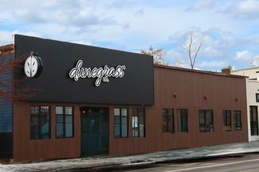
Opening the Green Door
New school teaches traditional skills
By Ross Boissoneau | April 12, 2025
School is in session, but don’t look for kids seated in desks or gathered around a lab table with a set of beakers. The students aren’t reading books or studying with iPads. Instead, you’ll find them washing balls of wool, or brewing kombucha, or carving wooden spoons.
Welcome to Traverse City’s Green Door Folk School, where the instructors aren’t teaching calculus or biology or grammar. Instead, the subjects include meditative stitching, amending the soil, turning raw wool into yarn, and more.
“I had a corporate career downstate. I spent decades looking at a screen,” says founder Kristina Schnepf. And all the while, “I wanted to do woodworking.”
Schnepf considered classes through Northwestern Michigan College, but wasn’t interested in any kind of degree program. She tried YouTube videos, but wanted more personalized instruction. And when she couldn’t find exactly the type of learning she was looking for, Schnepf created it.
“Crafts Alter the Brain”
The concept of folk schools is not new, and not even unique in the state or this area. The Michigan Folk School in Ann Arbor offers beekeeping, sewing, nutrition, and more, while the Kingsley Folk School includes storytelling and qigong.
With the goal of offering a variety of traditional skills—including woodworking, of course—Schnepf began researching subjects and potential instructors, as well as locations where the classes could be held.
Some of her first connections were with Ann Tyler and Dawson Moore. Tyler is a spinner and knitter, while Moore is a traditional woodworker, drawing from the Scandinavian sloyd tradition.
“I look at spinning as a fantastic mechanical phenomenon as well as a dance,” says Tyler. Which might not be obvious on the face of it, but as someone with a deep background in both fiber art and dance, who would argue?
Tyler has taught at various festivals and other gatherings, so becoming part of Green Door School was a natural fit. She’s taught classes ranging from three hours to three days, so her two-day classes for Green Door enable her to provide an overview as well as actual hands-on experience.
It starts with raw wool fleece which the class then washes. She then has the class prepare the cleaned fleece for spinning by using hand tools (flick card, hand cards, hand combs) before actually spinning it into yarn.
Moore’s classes also begin with the basics. Sloyd is a system of handicraft-based education dating back to 1865 in Finland and is still taught as a compulsory subject in Finnish, Danish, Swedish, and Norwegian schools. While sloyd gained a toehold in the U.S. in the late 19th century, by the mid-20th it was all but forgotten. Moore hopes to change that with his woodworking classes.
“Crafts alter the brain. They generate a state of flow, boost theta waves,” he says. For Moore, the process is about more than just making an object. It starts with choosing the wood, cutting it, then hand-carving it with a variety of traditional tools. Whether the end product is a spoon or a chair, he enjoys the process and passing the skills on to others.
“As a retail product, none of this stuff is necessary,” he says. “A $30, $40, $50 spoon is a luxury. You’re supporting an artist, buying into the artist’s story.”
Creativity, Curiosity, and Connection
Or you can teach others to make their own story. That’s the key to Green Door, where the story is always evolving. Heck, there’s not even a central location or single building—at least not yet—much less one with a green door. (The name is derived from the green door of Schnepf’s family home, which she calls a symbol of creativity, curiosity, and connection.)
Schnepf says she is always looking for classes that harken back to the skills needed by the people who pioneered homesteads a century or more ago. April’s events include building an intentional home garden, brewing kombucha, and growing mushrooms, while May’s classes dive into amending soil, wet felting, quilting, and even improv comedy..
“I hope to give people access to things they can’t get elsewhere,” says Schnepf.
Some of the classes are relatively brief, running just three or four hours. Others are day-long, while some can include the better part of a weekend. The current schedule runs through May, but Schepf is hard at work on more. “I’m putting summer together. We want to do it year-round,” she says.
Spring and summer classes will take place at venues such as Timberlee, SEEDS Farm and Shop, and the Almira Town Hall, as well as the instructors’ home venues, such as Bos Wine Garden, where winemaker David Bos teaches biodynamic farming.
That said, Schnepf isn’t opposed to the idea of a home for all or at least many of the classes. “We’ll get through summer and then look for a home base,” she says. Maybe even one with a door she can paint green.
For a current list of classes or to learn more, go to GreenDoorFolkSchool.com.
Trending

50 Years for Mode’s Bum Steer
On April 7, 1975, Bob and Anita Mode opened a bar and restaurant that was to bear their name. A half century later, Mode&rs… Read More >>
A Guide for the Pot Newbie
Michigan is now home to over 1,000 cannabis dispensaries and tenfold more cannabis products. As a newbie, navigating the evo… Read More >>
The Legacy of Student Activism
“It’s a physical letter to your representative,” Alex Tank says when asked to define the word “prote… Read More >>


